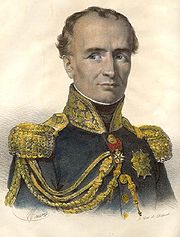
Antoine Drouot
Encyclopedia

Born in Nancy, France
France
The French Republic , The French Republic , The French Republic , (commonly known as France , is a unitary semi-presidential republic in Western Europe with several overseas territories and islands located on other continents and in the Indian, Pacific, and Atlantic oceans. Metropolitan France...
, the son of a baker, he trained as an artilleryman and took part in the battles of the French Revolution
French Revolution
The French Revolution , sometimes distinguished as the 'Great French Revolution' , was a period of radical social and political upheaval in France and Europe. The absolute monarchy that had ruled France for centuries collapsed in three years...
where he rose through the ranks.
Later he had an illustrious career in the many battles of the Empire
Napoleonic Wars
The Napoleonic Wars were a series of wars declared against Napoleon's French Empire by opposing coalitions that ran from 1803 to 1815. As a continuation of the wars sparked by the French Revolution of 1789, they revolutionised European armies and played out on an unprecedented scale, mainly due to...
, notably, Wagram
Battle of Wagram
The Battle of Wagram was the decisive military engagement of the War of the Fifth Coalition. It took place on the Marchfeld plain, on the north bank of the Danube. An important site of the battle was the village of Deutsch-Wagram, 10 kilometres northeast of Vienna, which would give its name to the...
, Moscow
Battle of Moscow
The Battle of Moscow is the name given by Soviet historians to two periods of strategically significant fighting on a sector of the Eastern Front during World War II. It took place between October 1941 and January 1942. The Soviet defensive effort frustrated Hitler's attack on Moscow, capital of...
, Lützen
Battle of Lützen (1813)
In the Battle of Lützen , Napoleon I of France lured a combined Prussian and Russian force into a trap, halting the advances of the Sixth Coalition after his devastating losses in Russia. The Russian commander, Prince Peter Wittgenstein, attempting to undo Napoleon's capture of Leipzig, attacked...
, Hanau
Battle of Hanau
The Battle of Hanau was fought on between Karl Philipp von Wrede’s Austro-Bavarian corps and Napoleon's retreating French during the War of the Sixth Coalition....
and Waterloo
Battle of Waterloo
The Battle of Waterloo was fought on Sunday 18 June 1815 near Waterloo in present-day Belgium, then part of the United Kingdom of the Netherlands...
. He became a major-general in 1805 and aide-de-camp
Aide-de-camp
An aide-de-camp is a personal assistant, secretary, or adjutant to a person of high rank, usually a senior military officer or a head of state...
to Napoleon in 1813. Napoleon called him le Sage de la Grande Armée (the sage of the Grand Army). He was with Napoleon during his exile to the island of Elba
Elba
Elba is a Mediterranean island in Tuscany, Italy, from the coastal town of Piombino. The largest island of the Tuscan Archipelago, Elba is also part of the National Park of the Tuscan Archipelago and the third largest island in Italy after Sicily and Sardinia...
, and during his brief comeback known as the Hundred Days
Hundred Days
The Hundred Days, sometimes known as the Hundred Days of Napoleon or Napoleon's Hundred Days for specificity, marked the period between Emperor Napoleon I of France's return from exile on Elba to Paris on 20 March 1815 and the second restoration of King Louis XVIII on 8 July 1815...
.
During the Battle of Waterloo
Battle of Waterloo
The Battle of Waterloo was fought on Sunday 18 June 1815 near Waterloo in present-day Belgium, then part of the United Kingdom of the Netherlands...
Drouot was ordered to relieve a corps of the army as the Marshall who would generally assume command fell ill, as a result it is argued that Drouot (an expert in artillery fire) was therefore dispatched ineffectively throughout the engagement.

